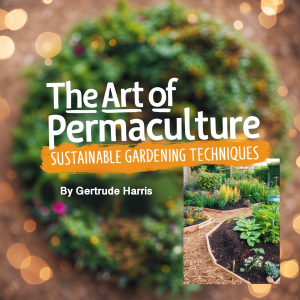

The Art of Permaculture
Gertrude Harris
Permaculture is more than just a gardening method; it is a holistic design system that seeks to mimic the natural world to create sustainable, resilient, and productive environments. At its core, permaculture is grounded in principles that prioritize ecological balance, efficient use of resources, and long-term sustainability. It offers an alternative approach to conventional agriculture and landscaping by encouraging the creation of self-sustaining ecosystems that require minimal input from external resources.
The term "permaculture" is derived from a combination of “permanent” and “agriculture,” though it has since evolved to encompass more than just agricultural practices. Permaculture is a design philosophy that aims to create systems that are not only ecologically sound but also socially and economically sustainable. It is a system of ethics and principles that can be applied to all areas of life, from food production and energy systems to community building and even urban planning.
One of the key tenets of permaculture is the concept of working with nature rather than against it. This means observing the natural systems around us—how water flows, how plants interact with each other, and how animals move within their environment—and designing systems that work in harmony with these natural patterns. By doing so, permaculture seeks to reduce waste, lower energy consumption, and minimize human impact on the planet.
Duration - 1h 49m.
Author - Gertrude Harris.
Narrator - Jessica Roberts.
Published Date - Saturday, 18 January 2025.
Copyright - © 2025 Gertrude Harris ©.
Location:
United States
Description:
Permaculture is more than just a gardening method; it is a holistic design system that seeks to mimic the natural world to create sustainable, resilient, and productive environments. At its core, permaculture is grounded in principles that prioritize ecological balance, efficient use of resources, and long-term sustainability. It offers an alternative approach to conventional agriculture and landscaping by encouraging the creation of self-sustaining ecosystems that require minimal input from external resources. The term "permaculture" is derived from a combination of “permanent” and “agriculture,” though it has since evolved to encompass more than just agricultural practices. Permaculture is a design philosophy that aims to create systems that are not only ecologically sound but also socially and economically sustainable. It is a system of ethics and principles that can be applied to all areas of life, from food production and energy systems to community building and even urban planning. One of the key tenets of permaculture is the concept of working with nature rather than against it. This means observing the natural systems around us—how water flows, how plants interact with each other, and how animals move within their environment—and designing systems that work in harmony with these natural patterns. By doing so, permaculture seeks to reduce waste, lower energy consumption, and minimize human impact on the planet. Duration - 1h 49m. Author - Gertrude Harris. Narrator - Jessica Roberts. Published Date - Saturday, 18 January 2025. Copyright - © 2025 Gertrude Harris ©.
Language:
English
Opening Credits
Duration:00:00:07
1 the art of permaculture
Duration:00:16:43
2 the art of permaculture
Duration:00:18:30
3 the art of permaculture
Duration:00:19:19
4 the art of permaculture
Duration:00:20:24
5 the art of permaculture
Duration:00:18:09
6 the art of permaculture
Duration:00:12:47
Conclusion the art of permaculture
Duration:00:02:52
Ending Credits
Duration:00:00:10